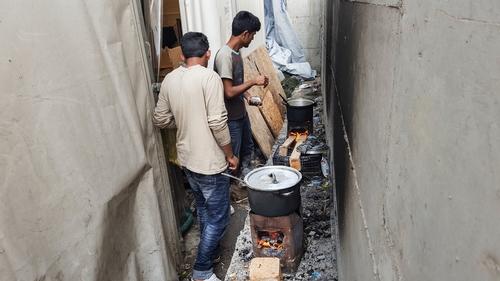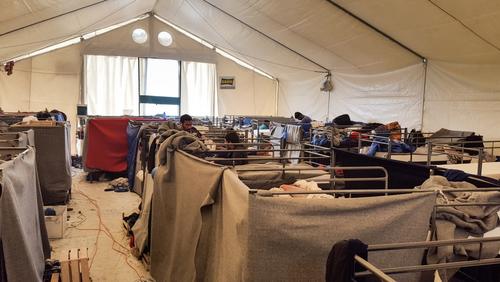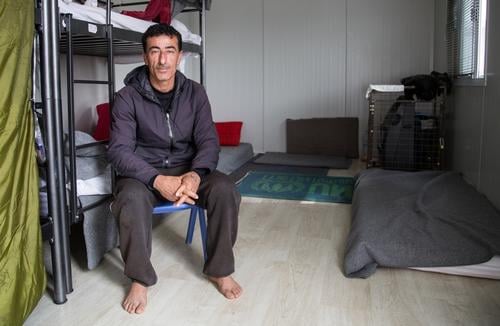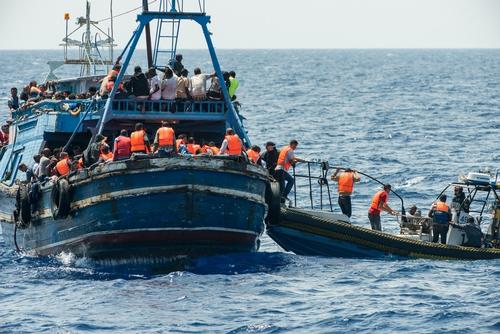MSF has been providing medical and humanitarian assistance to asylum seekers and migrants in Greece since 1996. In 2014, MSF expanded its activities in Greece to meet the needs of asylum seekers arriving on the Greek islands and mainland from Turkey. Since 2016, MSF medical teams in Greece have offered services including primary health care, treatment for chronic diseases, sexual and reproductive health care, physiotherapy, individual and group/family clinical psychological care, as well as psychiatric care, along with a comprehensive social support package. Today, MSF provides services in downtown Athens, as well as on the islands of Lesvos, Chios and Samos. In 2017, MSF teams in Greece provided more than 32,000 consultations.
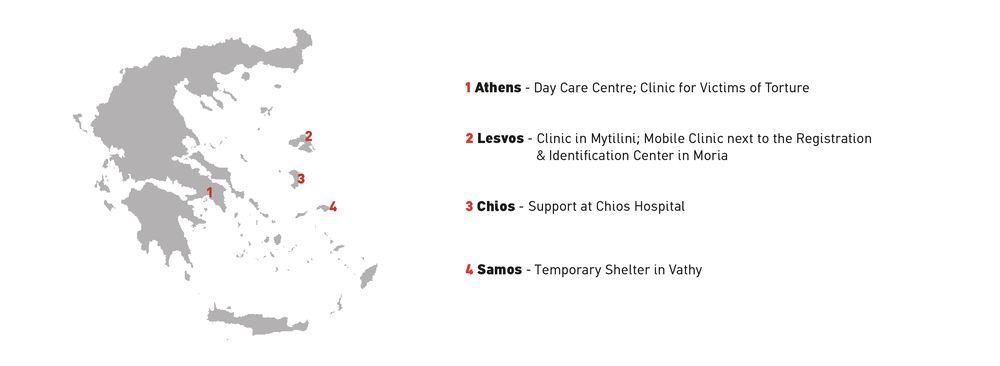
ATHENS
Day Care Centre
MSF has been offering sexual and reproductive health care, mental health care, as well as health promotion and education, through mobile units in refugee camps in Attika and Central Greece since April 2016. In September 2016, in order to respond to the medical and mental health needs of vulnerable people residing all around the city, MSF opened a day care centre in downtown Athens focusing on sexual and reproductive health care and mental health care activities, including care for victims of sexual violence and treatment for transmittable sexual diseases. As of July 2017, MSF started providing also treatment for chronic diseases, to cover the needs of patients staying in Athens on a longer term.
The MSF team has held more than 5,230 consultations with patients seeking medical help for sexual and reproductive health care issues, as well as more than 1,390 individual clinical psychological care and 300 psychiatric sessions within 2017. More than 620 consultations have been performed with people seeking treatment for chronic diseases.
In response to the complexity of the observed needs and the required holistic approach, the Day Care Centre started also providing patients with a comprehensive social support package that also includes links to legal aid actors; the social workers have held more than 1,250 sessions with patients for various requests within 2017.
There is also a strong referral component to the national healthcare system, with specialised cultural mediators accompanying patients to follow up appointments at hospitals. The outreach team provides health promotion and education sessions in camps and shelters around the city. An intervention of the health promotion and medical teams is planned once per week in the city of Patra in Western Greece, where more than 400 refugees – among them many unaccompanied minors - are staying in abandoned settlements around the city port. Finally, MSF recently launched an innovative travel medicine service automatically activated for patients to ensure healthcare continuity, through health advice, vaccination, medication, and referrals to MSF services elsewhere.
Clinic for Victims of Torture
MSF has been providing comprehensive care to survivors of torture and other forms of violence and ill-treatment in Athens since October 2014, when it opened a specialised clinic, in collaboration with established local partners ‘Day Centre Babel’ and the ‘Greek Council for Refugees’. Recognising the high prevalence of torture among the migrant and refugee population, as well as their crucial need for rehabilitation, the clinic has cared up until now for more than 530 people from 40 countries - mainly from DR Congo, Iran, Syria and Afghanistan. The MSF team has developed a multi-disciplinary approach to assist survivors in coping with their medical and mental health problems resulting from the systematic violence they have been subjected to. The majority of beneficiaries present musculoskeletal, neurological and gastrointestinal issues, as well as post-traumatic stress disorder, extreme anxiety and depressive symptomatology.
In addition to medical, mental health and physiotherapeutic care, torture survivors are offered social support and integration services, as well as legal aid to facilitate their access to the asylum system. In 2017, the MSF team carried out more than 1,370 medical, 1,140 clinical psychological care, 900 physiotherapy and 1,010 social worker consultations with torture survivors. MSF has been advocating for improved identification, care and rehabilitation for torture survivors in Greece. This advocacy has been directed mainly towards the health authorities, as well as other NGOs, and has involved working closely with other MSF teams on the islands. The identification of torture survivors on the islands as vulnerable cases is indeed crucial for facilitating their transfer to the mainland, where they can access better care and protection.
AEGEAN ISLANDS
Lesvos MSF has been working on the island of Lesvos since July 2015 adapting its activities according to the needs of the migrants and asylum seekers arriving. Originally present in the Registration and Identification Center (RIC) in Moria, MSF suspended its medical and mental health activities there following the EU-Turkey agreement in March 2016. In October 2016, MSF opened a clinic in the town of Mytilini for asylum seekers and migrants. The clinic provided primary health care, care for chronic diseases, sexual and reproductive health care, as well as mental health care. Since August 2017, it adapted its activities to focus on the medical and mental health needs of survivors of torture and sexual violence, as well as severe mental health conditions. In late November 2017, MSF launched an emergency intervention to improve the living conditions and access to medical care for the asylum seekers/migrants on Lesvos over the tough winter months.
The mobile clinic set up close to Moria camp has since been offering primary health care for children under 16 years old, as well as ante- and post-natal care for pregnant women and their new-borns. MSF refers patients to the local hospital for emergency cases, specialised care for chronic diseases and high-risk pregnancies. In February 2018, group psychosocial activities started for families with children. MSF teams provided more than 3,000 medical consultations, as well as more than 1,520 consultations with patients seeking advice for sexual and reproductive health care issues, and more than 1,880 individual clinical psychological care and 390 psychiatric sessions within 2017. Since end of November 2017 and till the end of the year, MSF teams also provided more than 1,600 pediatric consultations, as well as more than 150 consultations for antenatal care.
In December 2017, MSF donated winterisation items - blankets, sleeping bags, mattresses, hygiene kits - to volunteer networks active on Lesvos, for immediate distribution in Moria camp. In January 2018, MSF, in coordination with the camp management authorities proceeded to improvements in the water and sanitation infrastructure in the camp, to reduce morbidities among the camp population related to poor hygiene conditions. In early February 2018, MSF undertook an emergency measles vaccination campaign, in response to four confirmed measles cases identified among children in Moria and Kara Tepe camps. The campaign held in collaboration with the Ministry of Health and the Hellenic Centre for Disease Control and Prevention (KEELPNO) aimed to contain the spread of the disease, covering a total of 1,300 children living in Moria and Kara Tepe camps and other alternative shelters in the city of Mytilini.
Chios
MSF started working on the island of Chios in December 2017, providing cultural mediation services at the local hospital, with the aim to raise the staff’s capacity in addressing the healthcare needs. MSF cultural mediators help in the facilitation of medical consultations in burdened departments - emergency ward, pediatrics, primary healthcare, social service - and in the provision of information at the hospital front desk. In January 2018, MSF cooperated with a local volunteer network for the distribution of 500 blankets to people living in tents and rub halls around the VIAL camp. An additional MSF donation of 750 blankets was distributed, in cooperation with the Registration and Identification Service. In February 2018, MSF donated to the NGO CERST 500 personal hygiene kits to be distributed to refugees.
As from the end of March, the MSF mobile units will be holding daily visits to the VIAL camp offering primary health, sexual and reproductive health, as well as mental health care services. A social worker is already working to complement the support package and facilitate linking patients to legal aid actors locally and in Athens. Later on, a nurse will be available to follow patients suffering from chronic diseases, administering the appropriate medication and facilitating referrals to the local hospital for further check-ups. Realising the significant gaps in access to primary healthcare, as well as mental healthcare services, for this extremely vulnerable population, MSF will gradually scale up its effort to support the national healthcare system by supporting medical staff. Finally, in a few months’ time, patients about to be transferred to the mainland will be benefitting from the MSF’s travel medicine service to guarantee healthcare continuity, through health advice, vaccination, medication, and referrals to the MSF services in Athens.
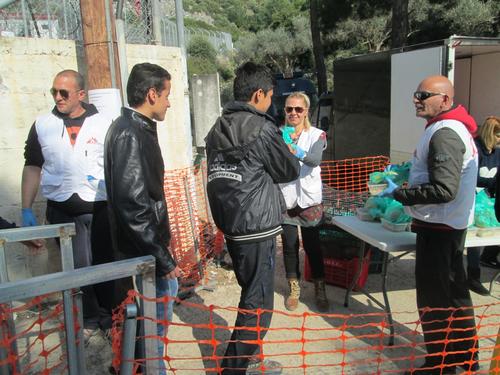
Samos
MSF has been working on the island of Samos since November 2015. MSF established a temporary shelter for vulnerable people on the island that can host up to 80 persons. They are identified and referred by the MSF team as well as other organisations working in the Registration & Identification Centre (RIC). MSF has been providing the shelter residents with referrals to the local hospital for specialized care, always accompanied by a cultural mediator. In January 2018, a significant part of the shelter capacity was handed over to Greek NGO ARSIS, in the framework of the phasing out of MSF’s presence on the island by the end of March 2018. MSF has been also providing mental health care services to a cohort of patients exhibiting mainly mood and post-traumatic stress disorders. The MSF team has held more than 810 individual clinical psychological sessions within 2017.
With extremely limited access to psychiatric care provided on the island, MSF has been also organizing psychiatric consultations with patients in need every two weeks. In preparation for the organisation’s decision to close its activities in Samos, the MSF team has been supporting the psychosocial teams of the National Center for Disease Control & Prevention (KEELPNO) in building their capacity for vulnerability assessment and clinical psychological care in the hospital. In September 2017, MSF ran a vaccination campaign, in collaboration with KEELPNO and Medin, for children till 15 years old in the MSF and other NGO-run shelters. The campaign covered all standard vaccines under public health protocols.
MSF has been also providing information on legal matters and individual assistance with asylum claims, in partnership with the Greek Council for Refugees. In 2017, 192 individuals/families were represented and supported by GCR / MSF lawyers among which 52 patients of MSF. MSF has been supporting the ‘Samos Volunteers’ group with in-kind donations; in early January 2018, a massive MSF donation of hygiene items was distributed through their volunteers’ network to the RIC population, to contribute to a needed sanitization effort of the overcrowded camp.
Further MSF proposals for improving water and sanitation facilities in the RIC, as well as rodent control, have been sadly refused by the RIC management. However, by the end of March 2018, MSF will be launching a laundry station very close to the RIC to be run by ‘Samos Volunteers’. Finally, between October 2017 and February 2018, an MSF team held a medical intervention in the police station of Vathy, in collaboration with other actors and competent authorities, visiting detainees every two weeks, in order to improve access to healthcare services and ensure the administration of needed medication and referral to the local hospital if needed.



